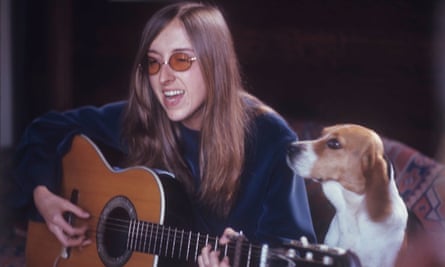The story of Judee Sill, a relatively obscure figure from the early 70s folk-rock scene, starts as another familiar fable of showbiz tragedy.
After a chaotic youth of abuse, addiction and petty crime – including heists on gas stations and liquor stores across California – Sill ended up incarcerated, first in reform school and eventually prison. It was there Sill became determined to pursue what she felt was her musical calling, and upon release, she began playing jazz bass and flute in the dark basements of the Los Angeles club circuit. She was the first artist signed to David Geffen’s Asylum Records in 1971, landing her a Rolling Stone cover and garnering the attention of music industry players like Graham Nash, who approached her as a producer enchanted by her “sense of melody and structure, which was really exceptional”.
However, Sill was never quite able to prosper. The two records she made on the label – her 1971 eponymous debut, and Heart Food in 1974 – were critically praised but flopped commercially, leading to a whirling vortex of rejection, despondency, domestic violence and a string of physical injuries that sucked her back into the addiction that eventually killed her, age 35 at her Hollywood apartment in late 1979.
It’s the kind of rock’n’roll calamity history is littered with, a fate many other mighta-beens have been lost to without fanfare. But decades after her death, Sill’s out-of-print studio albums have begun attracting a modest but devoted fanbase among a new generation eager to evangelize an artist whose work shimmers outside the confines of time.

Andy Brown and Brian Lindstrom, obvious fans themselves indoctrinated during the Judee resurgence of the early 2000s, sought to explore beyond the “Wikipedia version” of Sill’s life with their documentary Lost Angel: The Genius of Judee Sill, which premiered at Doc NYC this month and is streaming online though 27 November. Nine years in the making, it is the first work combining all available biographical information about Sill, including newly unearthed interviews and personal journals.
The film features an assortment of talking heads, from contemporary musicians and family to ex-lovers and collaborators, and Asylum Records cohorts including Geffen himself. Sill’s labelmate Linda Ronstadt acknowledges her music as “something special…it wasn’t in a category, it wasn’t in a niche. It was original.”
Indeed, the uncanniness of the genre-defying, Pentecostal-infused celestial folk-swing categorised by Sill herself as “occult-holy-western-Baroque-gospel” was a double-edged sword: it’s what prevented her sound from being absorbed by the audiences of her day, but also what has undoubtedly propelled her music into the public consciousness almost a half-century after her death.
Inextricable from the pandemonium of her personal life, her work reflects an internal struggle between darkness and light, and was believed by Sill herself to have been literally ordained by a higher power: “It comes to me from God, and then I look back and say hey, that’s mathematically perfect,” she says in the documentary. “It always comes out right.”
Jim Pons of the Turtles, who propelled Sill’s rising star in the late 60s when they covered her song Lady-O, relates this to her pickiness when it came to the composition and production of her music (which she did mostly single-handedly, down to conducting the orchestra for her second album): “She believed it was being downloaded by a higher source, and it had to be accurate. She was here on a mission to awaken the masses.”
Sill was a prodigious multi-instrumentalist with perfect pitch, something she considers to be ancillary to her songwriting talents, but which renders her music with more depth than that of her pop contemporaries. Big Thief’s Adrianne Lenker articulates something of this intoxication with Sill’s music in the film, ruminating on the pull of Sill’s song The Kiss that goes further than just how it sounds: “I [needed] to learn that song … It felt like something I could listen to throughout my whole life and continuously uncover more and more meaning. It just seemed like a bottomless well … a life-giving song. Like medicine.”
The directors, with the earnest enthusiasm of a fanzine, put forth an empathetic portrait of an artist who was neither fit for consumption during her life, nor for obscurity thereafter. Intimate scans of Sill’s private journals, enlarged onscreen, detail an astonishing bittersweetness. The use of her personal materials – chord charts scribbled frenetically with Pythagorean formulae and prayers intermingled with cartoons of moody waifs and desperate notes-to-self on how badly she wanted to “kick drugs” – re-contextualises Sill to the point of a strange resurrection. It presents the trove of what Sill left behind: an oeuvre so great that it survived not just her death but a decades-long cultural burial by an audience who just didn’t get it. We delight in coming to know her, even as we mourn what was never to be.
If the real sorrow of the Judee Sill story is that she was never properly known, the driving force behind her revival is that this forgotten music just has to be heard. A resolution is attained by bearing witness: we know now, and are listening.
Stay connected with us on social media platform for instant update click here to join our Twitter, & Facebook
We are now on Telegram. Click here to join our channel (@TechiUpdate) and stay updated with the latest Technology headlines.
For all the latest Music News Click Here
